
2 minute read
History: School As We Know It Today
History
School as we know it today is a very new development in human history.
Advertisement
Primarily, long before education was governed, people lived in communities and children were encouraged to play and explore, acquiring valuable life skills along the way.
Much of this relates to our ‘hunter gatherer’ background, when children would grow alongside adults who provided as individuals. Along came agriculture which changed the way in which communities operated, meaning some were encouraged to adopt servient roles, and some were more reliant on others for food. This changed the relationship between work and play, making the two more separate. Learning skills became less connected to natural living, and instead became a product of instruction and tasks.
Next came industries, and class systems, and from this mass rearrangement of human priorities mainstream school was born.
The mission statements of British schools today commonly contain content such as “structured programme of work”, “broad balanced curriculum” and “teaching presents an opportunity to discuss the history
core values”.
School is embraced by many as a predominant tool in shaping the futures of children, by time periods and ended on a specific note across the globe and throughout time, which
offering a universal education and a foundation on which to build their ambitions.
My personal view is that home education is enhancing the future for many children.
Liberating young minds by allowing free exploration, demolishing confinements, and encouraging learning free of pace or grade.
When instruction is replaced with imagination, grading is replaced with praising, and ability grouping is replaced with self-discovery, a child has the necessary support and freedom
Between the benefits to a child’s emotional wellbeing and the abundant access to knowledge and resources, homeschool is rapidly evolving into the best individually tailored education a child can access.
The way we view historical studies and incorporate it into home education is largely observational as opposed to formal.
While my child finds it interesting to study history, particularly learning facts about ancient civilisations, and how the earth has changed and evolved, she is more captivated purely by conversations regarding our surroundings and current events.
Almost everything she observes in daily life behind it.
Yesterday for example, she noticed differing architecture which led to discussion about about window tax, and why some houses have bricked up windows.
Recent focus on the Black Lives Matter movement has prompted many discussions about the suppression of black civilisations to flourish.
she has shown tremendous concern for.
We do discuss where most things start, but she is more curious about how things will progress.
I love to encourage her forward-thinking nature by responding to her questions with further questions, and seeing her contemplation expand. Surely this is the best method to initiate philosophising and problem solving.
History is useful for understanding how we came to be where we are now, but envisioning where we are headed is largely about being open to change. By adopting change in the way we raise and teach our children, we might be taking small but pioneering steps towards a better future for all.
Article By Missy Hitchcox
Missy Hitchcox is a Norfolk mother of two. She has a background of English Literature and Creative Writing studies. Her professional career has centred on the Beauty industry, and she now home educates her children.










